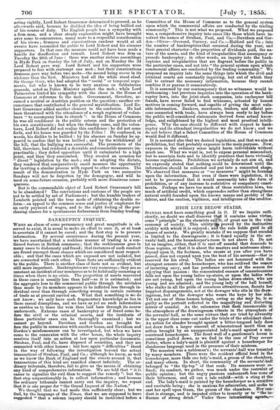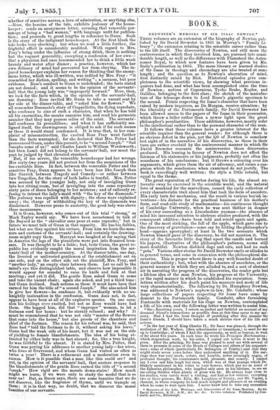HIGH LIFE BELOW STAIRS.
SCANDAL must have something good in it. If we inquire suffi- ciently, no doubt we shall discover t4It it contains some virtue, some "principle" as the chemists m1,1t, of great use in the vital economy of society. This utility* proved by the instinctive avidity with which it is enjoyed; and the role holds good in all classes of society. We greatly mistake if we suppose that scandal is limited to the drawingroom ; it is found equally in the ser- vants'-hall, and the housekeeper's-room is not above it. Do not let us imagine, either, that it is oast-off scandal that descends to those regions, or that it is about the masters and mistresses alone; depend upon it, the footman, who sneers at you after you have passed, does not expend upon you the best of his sarcasm—that is reserved for his rival. The ladies are not honoured with the strongest censure of the housekeeper, who has outlived the season of incurring envy, and has perchance arrived at the season for enjoying that passion : the concentrated essence of censoriousness falls not upon the young ladies up-stairs, or upon the ladies who are not young, but upon the young ladies down-stairs, who are young and are admired; and the young lady of the hall herself, who stalks in all the pride of conscious attractiveness, flaunts her happiest disparagements, not at the dowager who sits in the draw- ingroom, but at the dowager who wears the keys by her side. Yet not one of these human beings, erring as she may be, is so guilty as the portrait reflected in the magnifying and distorting mirror of scandal. As the calumnies that flash innumerable in the atmosphere of the drawingroom vibrate in the atmosphere of the servants'-hall, so the same virtues that are tried by adversity in the upper class come out under the trials of the attendant class. An action for slander brought against a bitter-tongued lady does not draw forth a larger amount of misconstrued merit than an action brought by an unappreciated lady's-maid against a mis- construed housekeeper. The front wall of a gentleman's house is sometimes pulled down, as we find in the case of Fray versus Potter, where a lady's-maid is plaintiff against a housekeeper for slanderous language used in the presence of their mistress. The mansion was a nobleman's ; the servants'-hall was tenanted by many members. There were the resident official head in the housekeeper, more thhi one lady's-maid, a groom of the chambers, and many others. In short, the community of the servants'-hall belonged to "the tip-top" of that rank. Its manners were re- fined; its conduct, we gather, was much under the restraint of public opinion ; but the angry passions underneath lose none of their bitterness, and all can a tale unfold—with a sting at the end. The lady's-maid is painted by the housekeeper as a sensitive and excitable being ; she is anxious for admiration and seeks to cast her spell upon Gunn, the groom of the chambers. Her con- duct is strange, and is imputed either to insanity or to "the in- fluence of strong drink. Under these intoxicating agents,— whether of sensitive nerves, a love of admiration, or anything else, —Rose, the heroine of the tale, exhibits jealousy of the house- keeper ; sends an anonymous letter, accusing that venerable per- sonage of heft% a "bad woman," with language unfit for publica- tion; and proceeds to great lengths in referenceto Gunn. Such is the story of the indignant housekeeper. At the first blush the tale looks very shocking; but when we read a little further, the frightful effect is considerably modified. With regard to Mrs. Fray's being under the influence of strong drink, there is nothing but the vaguest generality, excepting a confession of her own— that a physician had once recommended her to drink a little weak brandy and water after dinner ; a practice, however, which her own delicacy of mind had prevented her from obeying. The in- jured housekeeper explains her reason for thinking that the anony- mous letter, which was ill-written, was indited by Mrs. Fray : "it resembled her diction, spelling, and writing"; a sarcasm, but poor evidence. Hose's conduct to Gunn is undefended; the facts stated are not denied ; and it seems to be the opinion of the servants'- hail that the young lady was "improperly forward." Here, then, we look for the facts which, in the opinion of the servants'-hall, are damning : Rose invited Mr. Gunn to take a vacant seat by her side at the dinner-table, and "asked him for flowers." We all remember Boccaccio's story of Ciappelletto, the dying reprobate, who confesses to sins of such a character, that when he has told all his enormities, the monks canonize him, and rend his garments asunder that they may possess relies of the saint. The servants'- hail confesses its peccadilloes; and when it has sufficiently ma- ligned itself, the drawingroom is obliged to ask if for such scenes as these it would stand condemned. It is true that, in her com- plaint of misconstruction, the excited Rose Fray went further than the facts warranted; for she declared that Mrs. Potter had pronounced Gunn, under this pursuit, to be "a second Joseph." "Sad Josephs some of us!" said Charles Lamb to William Wordsworth ; but then Lamb did not belong to the servants'-hall, nor must the poet be judged by that elevated standard.
But, if too severe, the venerable housekeeper had her wrongs. Her sixty-two years did not protect her from the suspicions of the too excitable Hose. In fact, between the venerable Potter and the sensitive Fray, Gunn appears to have been less like Joseph than like Garrick between Tragedy and Comedy—or rather between two Tragedies, for the story of both ladles is tearful. Mrs. Potter was accused by the younger lady, not only of inveigling Gunn into her sitting-room, but of tnveigling into the same repository sixty pairs of shoes belonging to her mistress ; and of callously re- _fusing to intrust the lady's-maid with "the key of the diamonds." The jealousy was repelled with dignity; the shoes were explained away ; the charge of withholding the key of the diamonds was disclaimed. However prone to austerity, the good lady was above those meannesses. It is Gunn, however, who comes out of this trial "strong," as Mark Tapley would say. We have been accustomed to talk of the Bayard as the "chevalier sans peur at sans reproche," but in future we must talk of Gunn in that capacity. He has his foibles, but what are they against his virtues. From him we learn ihe man- ners and customs of the servants'-hall; and certainly the drawing- room might eopy them. Marryat was laughed at for saying that in America the legs of the pianoforte were put into flounced trou- sers. It was thought to be a fable ; but, taste Gunn, the great re- public has evidently caught the moral inspiration from the ser- vants'-hall of the mother-country. At the dinner-table, one day, the liveried or unliveried gentlemen of the establishment sat on one side, and on the other side sat the plaintiff, Mrs. Fray, and "another lady," an empty chair between them. Let us call to the mind's eye this distinguished table, and observe how impossible it would appear for scandal to raise its knife and fork at that meeting; and yet it did. The gentle Rose asked Gunn to come and take the vacant chair; again she asked, and yet a third time : but Gunn declined. Such actions as these it must have been that earned for him the title of " a second joseph." She also asked him to give her flowers—he confesses it, but evidently with no un- knightly insinuation in the confession. Gunn does not, iii fact, appear to have been at all of the explosive species. On one oeca- mon his feelings were excited, but not as Rose would have had them. She begged him, did that " improper " woman, to let a footman cord her boxes: but he sternly refused ; and why P It must be remembered that he was not only "master of the flowers
that came into the house," but also of the chambers and chief of the footmen. The *reason for groom was, he said, that Hose bad "told the foetman to do it, without asking his leave." Gunn had the weak side of his heart, but it was not on the side of yielding to female blandishments. The idea of his being at- tracted by either lady was in fact absurd ; for, like a true knight, he was faithful to the absent. It is stated by Mrs. Potter, that Gunn was paying lis addresses to another young lady—her niece, who lives at Gravesend, and whom Gunn had visited as often as twice a year! There is a refinement and a moderation even in excess. How is it possible that a man like this could err ? and yet, in the opinion of the servants'-hall, that austere response to the blandishments of the gentle Rose earned the title of "a second Joseph." How rigid are the morals down-stairs ! How much might we learn, if we were only to study the model that is so near us! But, as Bacon says, there are some beauties that we do not discover, like the fragrance of thyme, until we trample on them : it is in that way, no doubt, that we discover the moral banitiee of our servants.



























 Previous page
Previous page